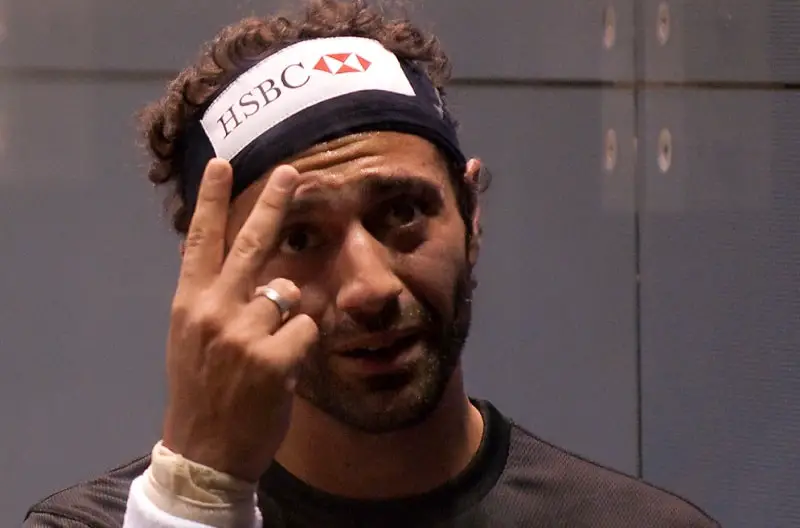When one thinks of squash, the followers of this sport typically remember the domination of Egypt and the oft-asked question is why is Egypt that good in squash? We endeavour to look at the reasons behind this.
Table of Content
A Bit of a History
The sport of squash traces its origins to the 19th century. Early exponents of the sport tried to combine tennis with rackets under a covered ceiling in the prisons of London.
In due course, the sport got popular in Harrow school and thereon caught up with schools all over Great Britain and the Commonwealth.
The fact that the sport required limited amount of space, involved high intensity activities and quick reactions made it sought after in Royal Air Force bases all over the globe. Thus, squash grew in places like Pakistan, Australia, New Zealand.
Having been dominated by the British and Pakistani greats for major part of its history, the twenty first century has been marked by the hold that the Egyptians have had on the sport.
The Egypt Gold Rush in Squash
To get an idea of how far the sport has progressed in the country, one only needs to have a look at the ranking tables.
In both the men’s and women’s game, players from Egypt occupy at least five out of the top ten ranking places. In fact, the top three players in both categories are Egyptians.
Since, 2013, an Egyptian has won the men’s world championship on eleven occasions.
In the last five years, the prestigious British Open has been won by a player from Egypt thrice both in the men’s and women’s category.
As of Dec 2019, Egyptian men have won 33 medals in world championships since the inception of the sport – second only to Pakistan and Australia. While the women have 22 medals in their kitty. A vast majority of these medals have been won post the turn of the 21st century.
In 2019, when Egypt won their second consecutive Men’s World Team Squash Championship in Washington DC, they brought their overall tally to five, thus equaling the record of the erstwhile squash powerhouse – Great Britain.
First Tryst with Squash Glory
What makes this Egyptian hegemony over the sport even more intriguing is that till the late 1990s there were very few squash success stories emanating from the region. President Hosni Mubarak – himself a squash enthusiast managed to get an international tournament organized in the country in 1996.
Things started to change with a breakthrough performance by a 19-year-old player who went by the name Ahmed Barada during this tournament.
His runner-up place combined with the passion he displayed on court caught the imagination of the country. Over the next few years, the player finally went on to reach number two in the world rankings.
Also Read:
The fact that his matches were televised helped inspire a generation of young players.
Former women’s world number 1, Raneem El Weleily was witness to Barada’s heroic performance in the backdrop of the pyramids in 1996 and thinks that is what initiated a number of children like her into the sport.
El Welily said:
“It’s hard to explain what that image did for our sport. Imagine a French athlete competing for a world title in front of the Eiffel Tower or an American doing the same in front of the Statue of Liberty.”
“Squash and Egyptian heritage became interconnected. As a young player, I associated what I was doing with pride in my flag and where I came from. The symbolism impacted all of us who had ambition.”
A Star is Born: Amr Shabana
The next catalyst for the rise of the sport in the country came with Amr Shabana becoming the first Egyptian to win the World Championship in 2003.
Combining racquet skills rarely seen before with immense speed and fitness, Amr Shabana went on to win several more championships.
He eventually became the first Egyptian to be crowned world number one. Ever since that achievement in 2006, an Egyptian has been the top-ranked male player for ten of the last thirteen years.
Squash, A Pathway to Higher Education
While generations of players aimed to emulate their charming role models like Shabana and Barada, squash also provided youngsters opportunities in other avenues as well.
The prize money to be won by excelling in squash championships is only a tiny fraction of those from sports like tennis.
However, good performances in squash became gateway for Egyptian youth to admission in top American universities.
In the hope that their children would receive the finest of education a number of Egyptian parents started pushing them towards the sport.
In fact, the present world number one – Ali Farag completed his degree in mechanical engineering from Harvard university.
In the process, Farag became the most successful squash player is US college history, suffering only two defeats in three years. Upon graduating, he returned to the pro circuit where he begun a rapid climb up to the apex of the world rankings.
When asked what is it that makes Egyptians so good at squash, Farag stated:
Even we can’t really believe it. We try not to think too much about it and rather focus on our own game. But it is interesting and it’s sort of always at the back of your mind.
Change in Approach and Rules
Since it’s inception, squash players followed the attritional method to win matches.
By prolonging rallies, rather than going for winners, those squash players who were at the peak of their fitness would often come out as winners. The change in point system from the Hand In – High Out (HIHO) to Point A Rally (PAR) meant that a point was scored irrespective of whether a player was serving or not.
Thus matches started becoming shorter and favored players who were more aggressive.
The Egyptian players who were derided for being un-coachable, erratic and impatient were more at an advantage with the new system.
Instead of waiting for the ball to bounce of the back wall and lengthening the duration of the match, the Egyptian players sought to meet the ball on the full.
The employment of drop shots and cross-court nicks increased as every rally became vital towards the final result of the match.
Also Read:
The Role of Geography
Farag noted he could improve drastically because of the kind of competition he had, which in turn, allowed him to compete against the best. He added:
“I can test myself against the best and play for two weeks without playing the same player. It’s a competitive environment. We want to beat each other. Sometimes the competition in training is more intense than in tournaments.”
In Cairo, there are a number of squash clubs within a short drive from one another. As a result, any new entrant into the game can expect to rub shoulders with the best in their country.
The squash community is known to be close knit and pushes each other towards achievement of excellence. Similar is the case with Alexandria which is the other major hub for squash clubs.
The access that young players have to world champions has a had a huge bearing on their rapid growth.
Take for example, Amr Khaled Khalifa. Khalifa who won the squash Junior World Championship in 2010, prepared for the tournament by training with legends like Amr Shabana and Barada.
Other Factors Why Egypt is Good at Squash
The fact that squash is one of the very few sports which give away the same prize money to both female and male winners has helped fuel its rise amongst women too.
Young women in Egypt look at the sport as a viable career option, one where they can reap the same benefits as their male counter parts.
Other aspects like players in Egypt getting to participate in multiple age group tournaments at the same time as compared to their counterparts in USA or England is a driving factor for their dominance right from junior and sub-junior levels.
Egypt’s ascendancy at the top of the squash throne has also coincided with the demise of the sport in countries like Pakistan and Australia.
With very little competition originating from the erstwhile powerhouses of the sport, Egyptians are facing lesser opposition in their race to squash supremacy.
Finals Words
Like long distance running is to Kenya, or cycling is to Great Britain, Egyptian success in squash is here to stay.
It has been built upon the legacy of charismatic champions of the past whose victories have fueled the efforts of a generation of players. Players trying not just to match but to surpass the records of their predecessors.


